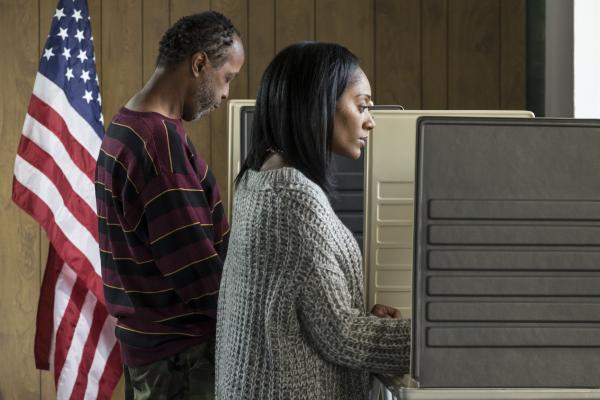ELECTIONS BRING Americans together for a common cause—electing the leaders who are supposed to represent us, our families, and our communities. Just as we are all equal before God, voting is supposed to be an opportunity for us all to be equal: Young, old, rich, or poor, we each should have an equal voice in our democracy.
However, too many Americans may not have fair access to the polls in the upcoming election. Many citizens’ votes have become collateral damage in a battle waged by politicians who want to rig the system so that some people can participate in our democracy and some cannot.
Since the 2010 election, 21 states have instituted new voting restrictions—the biggest rollback of the right to vote since the Jim Crow era. This year will be the first presidential election with many of these new barriers in place, from requiring photo identification (which millions of Americans do not have) to curtailing early voting (which many citizens depend on to cast their ballots). On top of this, voters will go to the polls in November with the fewest federal protections against racial discrimination in half a century, due to a 2013 Supreme Court decision gutting a key provision of the Voting Rights Act.
One of the most frustrating examples comes from my home state of Texas. After numerous failed legislative attempts, and amid procedural irregularities and dramatic Latino population growth in the state, the Texas legislature in 2011 passed the country’s strictest photo ID law, requiring specific types of photo ID to vote. The law was crafted with surgical precision. For instance, voters can use a concealed gun license as proof of identification, but not a student ID card, even from a state university. All told, more than 600,000 registered Texas voters do not have the kind of ID now required to cast a ballot.
Previously, the Texas law was blocked under the “preclearance” provision of Section 5 of the Voting Rights Act. But in 2013, the Supreme Court rendered Section 5 inoperative, saying Congress needed to update the formula used to determine which jurisdictions had to comply with these preclearance procedures. This decision, stemming from a suit brought by a county in Alabama, affects voters across the country.
The decision freed Texas to implement its discriminatory photo ID law. The photo ID law was then challenged under a different provision of the Voting Rights Act and the U.S. Constitution. A federal trial judge ruled the photo ID requirement was discriminatory and illegal. Texas appealed the case to the U.S. Fifth Circuit Court of Appeals, which may be the country’s most conservative appellate court. Nonetheless, last year the Fifth Circuit unanimously judged the photo ID law discriminatory and illegal. Now Texas has asked the entire Fifth Circuit to review the case. Meanwhile, despite three court rulings against it, Texas has been implementing this discriminatory law in every election it has held since 2013.
The news is not all bad, though. Other states are moving toward a system that brings us closer to the equal democracy we all deserve: automatic registration. Automatic registration is a groundbreaking reform that shifts the burden of registering eligible voters to the government by making two modest, but important, changes to traditional voter registration.
First, automatic registration signs up eligible citizens to vote when they interact with government agencies, unless they actively decide not to register. The change is subtle, but significant. (The current method requires the citizen to take affirmative steps to register.) The second change under automatic registration is in how government agencies transmit registration information. Instead of sending paper registration records that have to be entered by hand, automatic registration transfers voter registration information electronically. This is less tedious, results in fewer errors, and is much cheaper than relying on paper records. Both Oregon and California have passed laws allowing for automatic registration at motor vehicle offices, and similar bills have been introduced in nearly two dozen other states.
Both trends—rollbacks on access to the ballot box and efforts to modernize registration so that it’s easier—show that there remains an active and ongoing fight over the right to vote. Voting lies at the root of democracy, and democracy is strengthened when more eligible voters are brought into the process. For us to have a democracy that is truly of, by, and for all of its people, we must ensure equal opportunity for every eligible citizen to participate.

Got something to say about what you're reading? We value your feedback!

